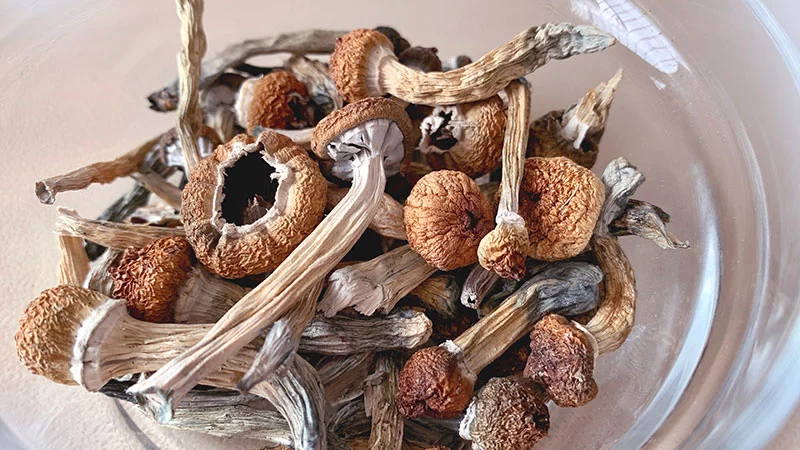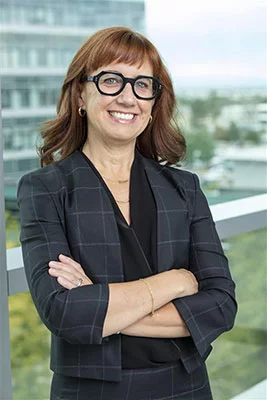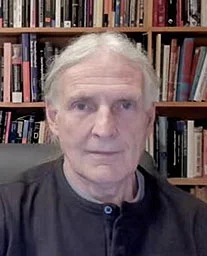
Can psilocybin help people with advanced cancer who are coping with anxiety, depression, fear of death and loss of hope.
That’s the key question that a large national clinical trial aims to answer.
The trial, which is taking place at the University of Colorado Anschutz Medical Campus and at New York University, is exploring whether the psychedelic compound in “magic mushrooms” can help cancer patients.
The National Cancer Institute is funding the trial and researchers are continuing to enroll patients. The study is the nation’s largest clinical trial exploring psilocybin use in cancer patients.
When people think of psychedelic mushrooms, many may think of wild trips full of swirling colors, dreamlike states or terror-filled encounters with imaginary beings.
But in recent years, medical experts have been exploring whether psychedelics — including psilocybin — can help people who are coping with treatment-resistant depression. The cancer study focuses on a subset of these people: advanced cancer patients who have anxiety that is also fueling depression.
Why is there a need for new therapies to support cancer patients coping with depression?
Dr. Stacy Fischer, a geriatric and palliative care specialist at UCHealth University of Colorado Hospital, is leading the psilocybin clinical trial with two other experts: Jim Grigsby, who has a doctorate in psychology and is a professor at University of Colorado Denver, and Dr. Steven Ross, a clinical professor of psychiatry and child and adolescent psychiatry at the New York University Grossman School of Medicine.
Fischer said additional research on psychedelics, like psilocybin, is vital because some people do not respond well to traditional therapies.
“Antidepressant medications, like SSRIs, often have no benefit or very little benefit for these patients,” said Fischer, who is also a professor of Medicine-Internal Medicine at the University of Colorado School of Medicine.
“There are real limits to our current pharmacological treatments,” Fischer said.
As for psychotherapy, it can have “modest benefits” for some patients, Fischer said.
“But it’s often a longer process, and especially when people aren’t feeling well, it can be really hard to make the gains we’re looking for,” she said.
Advanced cancer also makes it difficult for patients to use exercise to clear the clouds of depression.
“They are facing physical challenges,” Fischer said. “When your body can no longer do the exercise, that’s another thing to grieve.”
How does the psilocybin clinical trial for cancer patients work?
Cancer patients in the current clinical trial have three preparatory therapy sessions before they receive a 25-milligram dose of a synthetic form of psilocybin or a placebo. For the eight-hour dosing session, patients enter a quiet, comfortable room, wear eye shades and listen through headphones to a curated playlist of music.

Two therapists sit with patients throughout the session, encouraging them to fully pay attention to whatever issues may arise. If it seems necessary, the therapists can also administer anti-anxiety medications, in what Fischer called the highly unlikely chance a patient needs them.
The treatment doesn’t end when patients leave the dosing room. The same therapists meet with patients multiple times for a series of follow-up “integration” sessions that Fischer said are crucial elements of the treatment.
“We call it ‘integration’ because it is an opportunity for patients to integrate the experience of the dosing session into the larger context of their lives,” she said.
The Center for Psychedelic Research has assumed a major role in training people to facilitate psychedelic-assisted mental health care. The center operates a 16-week program, organized by Vivian Shyu, director of education and training in the University of Colorado Denver Center for Psychedelic Research, that is the first in the state approved by the Colorado Department of Regulatory Agencies under the Natural Medicine Health Act, passed in 2022.
Grigsby said the facilitator training program is a vital part of administering psychedelics ethically. The idea, decades old, is that people taking psychedelics have a much better chance for a fruitful experience in a safe physical and social setting, accompanied by individuals with whom they have established trust.
“These kinds of interactions contribute to a feeling of security, safety and confidence in the people who are conducting the study,” Grigsby said.
How do patients respond to psilocybin treatment?
So, with all the careful preparation, what do patients with advanced cancer experience after taking psilocybin?
Fischer does not know which patients received the dose of psilocybin versus the placebo and can’t comment on any individual’s experience in the trial.

Ross’s 2016 study, however, reported in the Journal of Psychopharmacology, found that patients quickly experienced less depression, as well as “decreased cancer-related existential distress, increased spiritual wellbeing and quality of life,” and “improved attitudes towards death.”
The effects “potentially” lasted as long as eight months after treatment, the authors added.
Some patients in Ross’s study also reported “mystical-type” experiences that contributed to decreasing their symptoms of depression and anxiety.
“People often describe this experience as ‘ineffable,’ or beyond words,” Fischer said. “It’s the idea that we’re all part of something bigger than ourselves, that we are all connected – and that this isn’t a subjective belief, but an objective reality.”
Such reports, often involving people experiencing a loss of ego, have roots that stretch far back in time, Grigsby said.
“They are subjectively very similar to the kinds of experiences that have been reported around the world by people of different religious and philosophical orientations,” he said.
Research into psychedelics in the 1950s also included descriptions of people having mystical-type experiences. Decades later, Dr. Roland Griffiths, professor in the departments of Psychiatry and Neurosciences at the Johns Hopkins University School of Medicine, documented in a 2008 study “spontaneously-occurring mystical experiences” among volunteers who took psilocybin under controlled conditions.
Volunteers called these mystical excursions “among the most personally meaningful and spiritually significant experiences of their lives,” Griffiths and his co-authors wrote, and they “produced positive changes in attitudes, mood, altruism, behavior, and life satisfaction.”
Exploring psilocybin’s impact on anxiety and depression in advanced cancer patients
Grigsby emphasized that mystical experiences with psilocybin are “relatively infrequent,” and while they can have “profound therapeutic effects,” he does not believe they are a prerequisite for people finding relief from anxiety, depression, moral distress and other symptoms.
“There is something about the nature of the psychedelic experience itself that has therapeutic effects,” Grigsby said.
Warning that “almost anything we can say about that oversimplifies it,” he said psychedelics seem to drive in some people a loss of ego and enhanced connectivity between areas of the brain. The changes also center on neuroplasticity – the brain’s malleability, which enables it to change thoughts, form new connections and alter perceptions and memories.
Fischer said the broad scope of research into the therapeutic power of psychedelics puts the lie to the old anti-drug commercial that featured a split screen showing an egg in a pan with no heat under it (“your brain”) and a frying egg (“your brain on drugs”).
“Actually, when you look at functional MRIs of what’s happening when people have taken a psychedelic, it’s like their whole brain is lit up with connections,” she said.
Cancer-focused psilocybin trial part of broader push to rethink mental health care
The current trial is far from a one-off. It extends a long line of inquiry about using psychedelics to treat mental health conditions, said Grigsby, who is executive director of the University of Colorado Center for Psychedelic Research, where Fischer serves as medical director and director of clinical trials.
The University of Saskatchewan at Regina (now University of Regina) conducted pioneering research on psychedelics as treatments for anxiety and other mental health issues and alcoholism in the 1950s and 60s, said Grigsby, who earned his Master of Arts degree in psychology there in 1976.
“I found that early on, there had been about a thousand research papers published on the subject, mostly on LSD and mescaline,” Grigsby said.
That work was stymied in the early 1970s, mostly by political opposition and public fears about drug use, Grigsby said.
Interest in psychedelics as a treatment for mental health conditions and as an aid in palliative care for patients with debilitating diseases slowly reemerged in the 1990s. For example, in 1992 the Multidisciplinary Association for Psychedelic Studies (MAPS) launched an FDA-approved study of the psychedelic MDMA to treat “physical pain and psychological distress” in end-stage cancer patients.
The principal investigator for the MAPS trial, Dr. Charles S. Grob, a professor of clinical psychiatry at Harbor-UCLA Medical Center, went on to lead another that used psilocybin to treat anxiety in patients with advanced-stage cancer. A third, currently underway, studies psilocybin as a treatment for “demoralization” in patients nearing the end of their lives.
Grigsby, who co-led a trial of MDMA-assisted therapy to treat PTSD, co-edited a book with Grob that surveys the uses of psychedelics to ease a wide range of mental health challenges posed by anxiety, depression, end-of-life fears, PTSD, and substance use disorders.
A 2015 a New Yorker article and subsequent book by Michael Pollan that examined psilocybin and other psychedelics as treatments for psychiatric disorders stirred the public’s interest in the drugs, Grigsby said. Indeed, Fischer said Pollan’s original article fired in her a “sense of excitement,” especially with its stories of patients with serious cancer losing their fear of death after receiving a dose of psilocybin under monitored care.
“As clinicians, we bear witness to this, we listen,” said Fischer, who has worked in palliative care for 25 years. “You want to help to relieve those problems. That has been a real challenge because we don’t have interventions, and our tools are pretty limited.”
Pushing research on psychedelics further
Fischer, Grigsby and their NYU colleague, Ross, hope to continue advancing research on psychedelics. They are central figures in the ongoing revival of interest in psilocybin as a treatment for mental health challenges.
Once again, past is prologue. Ross led an influential randomized controlled trial in 2016 that showed psilocybin helped to reduce anxiety and depression in patients with advanced cancer.
Despite its success, a follow-up trial languished for several years until Fischer and Grigsby agreed on the need to push for a grant and joined forces with Ross to craft and get approval for the current study, now in its fourth year.
Thirty cancer patients of a total target of 50 had received the psilocybin treatment at UCHealth as of mid-August, Fischer said. (The overall enrollment target is 100 patients between CU and NYU.) These patients’ experience is far from the practice decades ago, when people received a psychedelic and then rode out whatever they confronted, often alone.
“A lot of times, psychiatrists doing research, in particular with LSD, would just give people the drug and then leave the room,” Grigsby said.
The expanding universe of psychedelic research: psilocybin for depression
Meanwhile, UCHealth and the University of Colorado are exploring other therapeutic uses for psychedelics. A trial underway, led by Dr. Andrew Novick, an assistant professor of psychiatry at the University of Colorado School of Medicine explores whether psilocybin can help relieve symptoms in patients with treatment-resistant major depressive disorder and anhedonia, or loss of pleasure in everyday activities.
Fischer said the two trial teams collaborate, sharing dosing rooms, test protocols and a pool of raters – independent clinicians who validate the accuracy of the studies’ measurements.
In addition, Fischer is principal investigator for a trial of psilocybin-assisted psychotherapy for patients who are in remission from early-stage breast cancer or ovarian cancer, but fear recurrence of their disease. The University of Colorado Cancer Center and the Cancer League of Colorado provide support for the trial, she said.
Another potential trial, though not yet funded, would examine using psilocybin and potentially LSD to help treat chronic cancer or back pain in older adults, Fischer said.
Cautious optimism for the future of psychedelic treatment
She and Grigsby both acknowledge that stubborn stigmas and especially regulatory hurdles mean that widespread adoption of psilocybin-assisted therapy remains a challenge. But they also believe that careful research and study can turn the tide.
“We have compelling preliminary evidence to suggest it works,” Fischer said. “I think over time, these stigmas will fall away, especially if we conduct high-quality, rigorous science.”
Grigsby acknowledged that he is wary of making predictions about psychedelics gaining traction as treatments.
“I was optimistic in the ‘70s,” he said. “But based on what we know so far, and a lot of associated research, I think it’s going to be a very important approach to treatment.”
